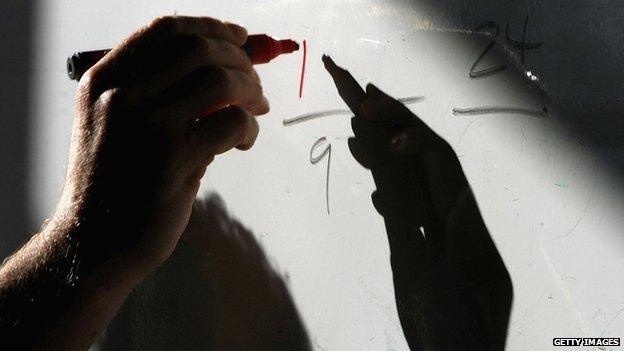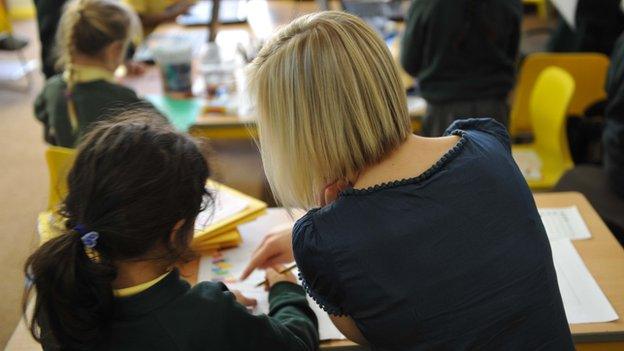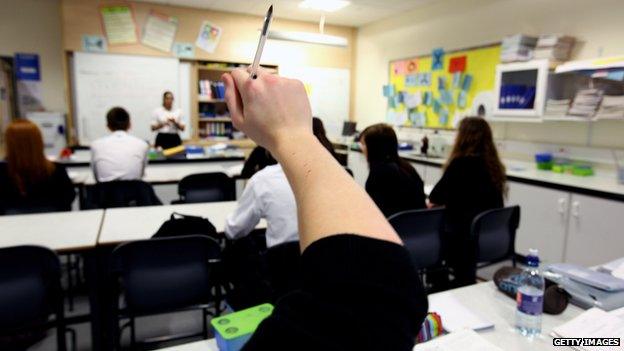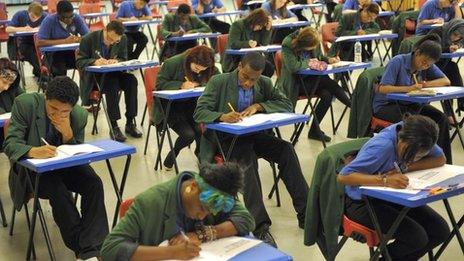Can Tory plan save failing schools?
- Published

This weekend, after a fairly quiet conference season, schools drifted back onto the political agenda.
On Monday morning, the Conservative Party announced an interesting batch of proposals to try to help turn around struggling schools - what it has dubbed a "rescue package" for them.
One part of it is rather novel.
If the Conservatives win the next election, they want to a build up a corps of 1,500 centrally contracted teachers by 2020 that the government can then send to struggling schools.
At the moment, it is being dubbed the "National Teaching Service".
The NTS, the party says, would be made up of "outstanding teachers and middle leaders who could be placed into failing or coasting schools to help rapidly improve standards".
This is not totally novel. There is already a smaller scheme like this for head teachers.
To make it worth their while these crack teaching troops (probably to be called "fellows") will get extra pay and training.
Recruitment barriers
The party says - with 1,500 of them - it could place two of these teachers in "every failing school". And it would seek to tackle England's regional problem.
Conservative Party officials say it will be geographically focused. London schools are light-years ahead of those in the rest of the country - and the local labour market must be part of that phenomenal success.
While schools struggle to recruit good teachers in much of the urban north and on the coast, London is swimming in them.
You can think of the NTS as a way to redress the balance; it is seeking to sell teaching in places like Hull, where schools struggle to recruit, to teachers across England.
So will the NTS work? There are some big practical problems, which may make or break such a scheme.

First, there is a big question about how you get teachers to join. More money will help - but may not be enough.
Teachers are already often paid more in Northern towns - relative to local cost of living - than in London (see, for example, page 61 here, external).
Some local recruitment barriers are very hard to overcome.
I've written about teachers' love lives in this context before. Some teachers chose teaching specifically so they can get a job in a specific area. Moving defies that point.
Second, even if you get the teachers in, there are straightforward practical problems in this kind of scheme.
The placements can be for between two months and two years. How much notice will they get? How much choice? Can they refuse?
It's also not easy to pick good teachers who can turn around a school.
Trial and error
Being a good turnaround teacher is not exactly the same skill set as just being a good teacher. They will need diplomacy skills, too.
Their presence will annoy some new colleagues, but they will need to keep them onside as they lead and train them.
Head teachers will know who on their staff would do well - but they may be pretty wary about helping to identify potential NTS fellows.
After all, the kind of teachers you want for this won't be working in easy schools and the loss of good teachers is always a blow.
All of those concerns are practical, not principled. This kind of stuff is difficult.
If a future government was serious about making it work, there would be a lot of trial and error along the way. But, if any of this were easy, there would not be a problem for NTS to solve.

The Conservatives also announced a few other odds and ends.
It wants the eight regional schools commissioners - the Department for Education's lead local officials - to be given new powers to immediately deal with schools that receive a bad inspection result.
For example, they say the commissioners should be able to change staff and demand setting by ability.
The principle is that schools can start to be turned around before the conversion to "sponsor academy" status - the current main mechanism for addressing failure, by which schools are put under new management.
That process can, in some cases, take a little while.
How much does this part of the plan matter? If sponsor academies continue to be used, and the DfE's local panjandrums confine themselves to fiddling with schools in transition to smooth the process along, this may be a minor issue.
However, that is quite a big "if".
Powers, once granted, tend to be used. But I still think the NTS is more interesting: it is another sign that the biggest conversation in English education is now about the only force in our schools that is more powerful than poverty: geography.
- Published13 October 2014

- Published7 March 2014

- Published9 July 2014

- Published30 April 2014
